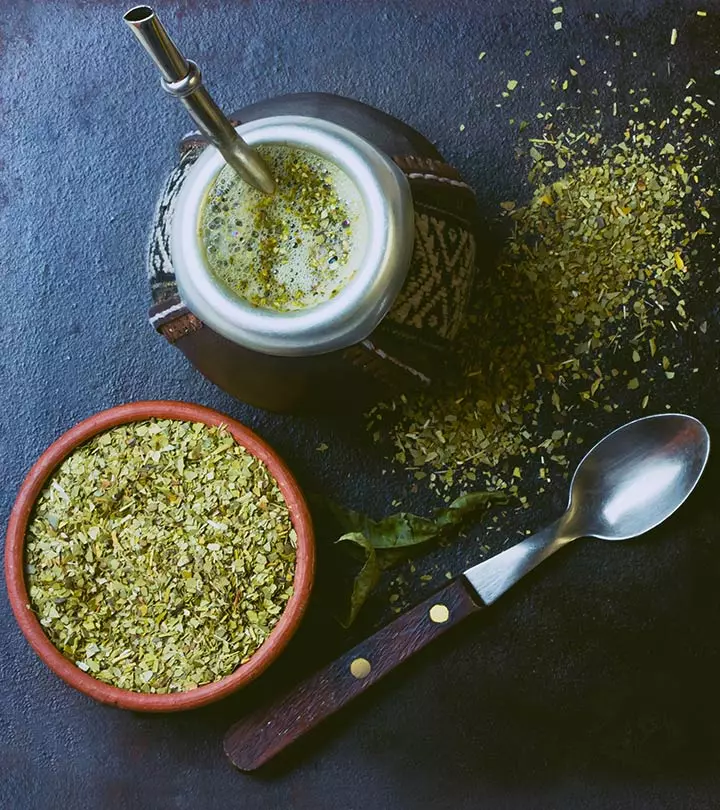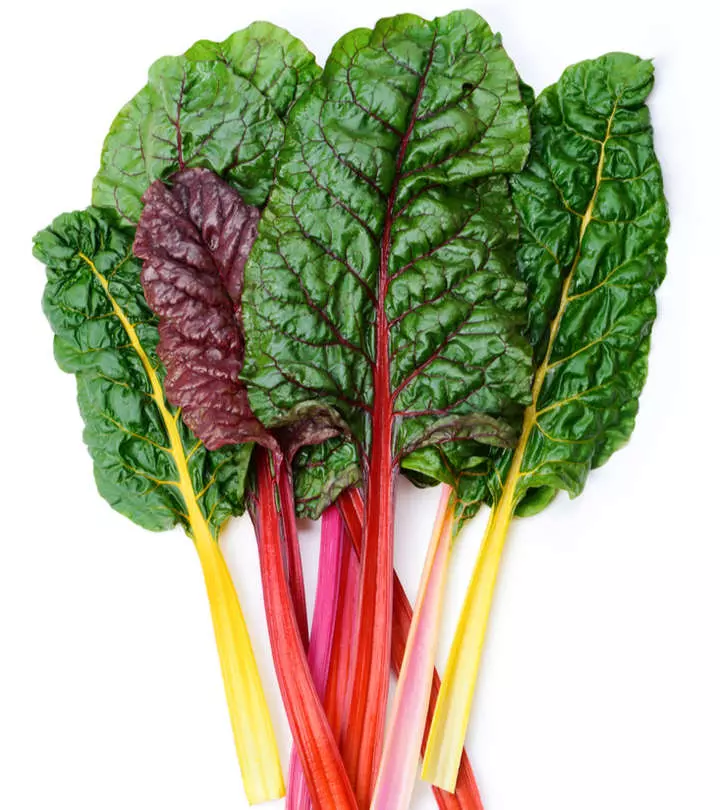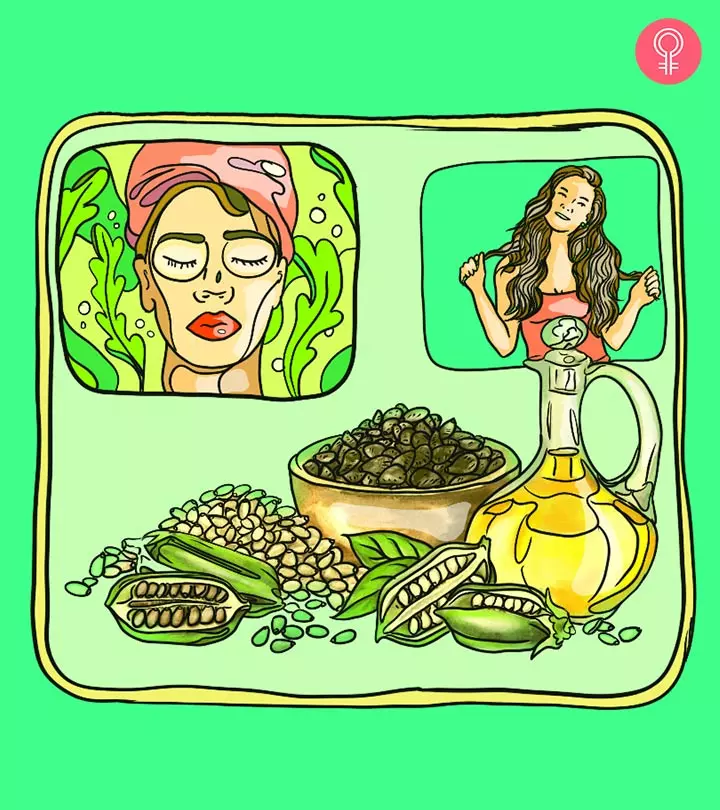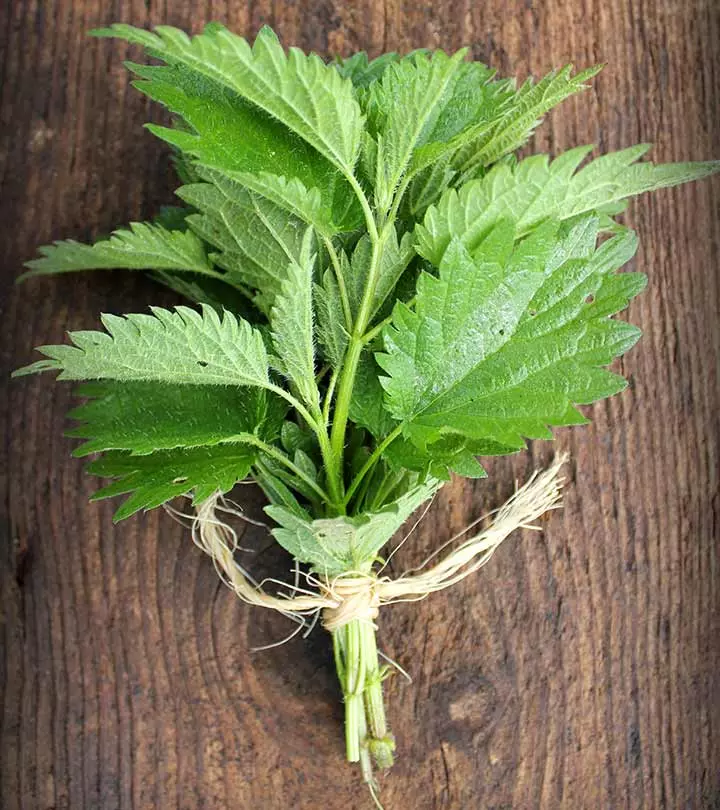Caffeine Side Effects: 17 Negative Effects You Should Know
Unfortunately, your morning cup of joe can do you more harm than good.

Image: Source: Shutterstock
The side effects of caffeine come into the picture when the intake goes out of your control. Yes, it has stimulating properties, but many studies suggest that indiscriminate coffee intake may also cause sleep disturbances and induce anxiety in some individuals (1).
What is more disturbing is that caffeine is addictive and may sometimes result in side effects even when consumed in safer dosages. This article explains the 17 ways excess caffeine intake can negatively impact your body, its withdrawal symptoms, and the recommended dosage. Read on!
 Know The Flip Side: Caffeine
Know The Flip Side: CaffeineShort-Term Effects
Headache, insomnia, stomach disorders, anxiety attacks, and increased blood pressure.
Long-Term Effects
Increased risk of cardiovascular disease, miscarriage, increased risk of urinary incontinence, and osteoporosis.
Drug Interactions
May interact with blood thinners and antidepressants.
When To See A Doctor
If you experience severe headaches, shortness of breath, severe stomach pain, and heart palpitations.
In This Article
Caffeine – A Brief
Caffeine is a well-known component of popular drinks like coffee and tea. It acts as an instant energy booster. The most known caffeine benefit is that it helps people fight drowsiness. Yet there is a lot of controversy surrounding its dosage and effectiveness.
Caffeine, scientifically known as methyl theobromine, is an alkaloid. This natural substance is found in many plants, including coffee beans, tea, kola nuts, and cacao pods. This alkaloid is an important part of the commercial platform, and its man-made form is widely used in the production of pharmacy drugs, drinks, chocolates, and coffee infusions.
 Did You Know?
Did You Know?According to studies, caffeine is the most widely consumed psychostimulanti A drug or a substance that can enhance mood and mental alertness and may reduce depression and fatigue. in the world (2). This shows how it is also likely to be over-consumed.

A study conducted on 26,680 U.S. service members showed that 87% of them consumed caffeinated products more than once a week. Out of these, coffee had 68% usage, sodas had 42% usage, energy drinks and teas had 29% usage each, and caffeinated gum had 4% usage.
Key Takeaways
- Excess caffeine consumption can lead to a variety of issues like anxiety, stress, acne, and skin allergies.
- Pregnant women should avoid caffeine as it may increase the heart rate and metabolism of the fetus or result in delayed fetal growth.
- Those trying to break away from a caffeine dependency may experience withdrawal symptoms like headaches, irritability, lethargy, and muscle pain.
- Adults should limit their caffeine consumption to 400 mg, while teenagers and young adults should limit their intake to 100 mg.
- Understand the impacts of caffeine to make more informed decisions regarding consumption and overall wellness.
How Does Caffeine Affect Our Body?
As it is water-soluble, caffeine is readily absorbed in our system. It reaches our bloodstream in no time, starting from the stomach to the brain. Does it have any side effects? Read on to know.
Caffeine Side Effects
- May Induce Anxiety Attacks
- May Cause Stomach Disorders
- May Cause Insomnia
- May Cause Miscarriage
- May Increase Blood Pressure Levels
- May Induce Menstrual Problems
- May Increase The Risk Of Urinary Incontinence
- Might Cause Weight Gain
- May Cause Hallucinations
- May Increase The Chances Of Osteoporosis
- May Interfere With Estrogen Production
- Can Increase The Chance Of Breast Tissue Cysts
- May Not Be Good For Individuals With Type 2 Diabetes
- Can Inhibit Collagen Production In The Skin
- May Impair Hearing Loss Recovery
- May Trigger Acne
- May Cause Allergies
Its addictive nature makes caffeine a big risk, especially among teenagers and adults.
The widely experienced symptoms of too much caffeine in the body include dehydration, excessive production of urine leading to dehydration, stomach disorders, nausea, increased blood pressure, depression, restlessness, jitters, increased heart rate leading to death, obesity, increased body weight, and fever.
Read on to get a detailed picture of caffeine side effects:
1. May Induce Anxiety Attacks

Excessive intake of caffeine can lead to a serious case of anxiety. Studies done on secondary school children showed that a high intake of caffeine could be associated with feelings of anxiety and stress (3).
A person with anxiety is known to experience mood swings, nervousness and restlessness, even under normal conditions. Caffeine worsens such conditions (3). Hence, one should be very cautious if they experience these symptoms.
Prevention Method
People with anxiety disorders should consult their physicians before opting for caffeine. This may rule out the chances of drug interactions.
2. May Cause Stomach Disorders
The acids present in caffeine stimulate the stomach to produce more acid. Caffeine (coffee) seems to promote gastroesophageal refluxi A chronic condition that occurs when the stomach acid consistently goes back into the esophagus, the pipe connecting the throat to the stomach. (4). Anecdotal evidence suggests that too much caffeine may also lead to digestive issues and stomach disorders, such as nausea, cramps, diarrhea, and bloating.
Prevention Method
If you have a weak stomach, restrict your daily dose of caffeine to two cups (maximum).
3. May Cause Insomnia

Insomnia is a sleep disorder in which a person finds it difficult to fall or stay asleep. It is a withdrawal symptom, which is combined with other physical problems, such as increased fatigue and headache. This is a common sign among those who consume a lot of caffeine.
Such people would experience sleeplessness and irritability if they were to withdraw from caffeine. Though certain studies did not find major effects, the intake of caffeine right before bed has been associated with tremors, sleeplessness and palpitations (5).
Prevention Method
The easiest way to tackle insomnia is by avoiding caffeine before going to bed. Cutting down on the number of cups per day can also help.
4. May Cause Miscarriage
Pregnant women should be extra cautious with caffeine as excessive intake may lead to miscarriage and other pre-delivery complications (6).
Caffeine is water-soluble and easily crosses the placenta through the bloodstream. As it is a stimulant, it can cause a rapid increase in the heart rate and metabolism of the fetus. One of the side effects of too much caffeine includes delayed fetal growth (7).
Breastfeeding mothers should not consume more than two cups of coffee per day as it affects the baby directly by causing physical irritability. It may also affect iron status in the infant (8).
Prevention Method
Consult your family physician before you decide to take caffeine regularly. Under any circumstances, would-be mothers should not take more than 200 mg of caffeine in a day.
5. May Increase Blood Pressure Levels
People who have hypertension should be cautious about the amount of caffeine they consume on a daily basis.
Caffeine is known to spike your blood pressure for a short time (9). While there are no long-term effects of caffeine, some believe it may worsen the condition in people with irregular heart rhythms. On the other hand, certain studies state that the intake of coffee is not linked to hypertension (10). Hence, more research is needed to establish a connection.
Caffeine is also associated with a heart attack in young adults. According to a study, young adults with mild hypertension who consume more than four cups of coffee in a day are four times more vulnerable to heart attack than those who consume two cups or less (11).
Prevention Method
If you have hypertension or cardiovascular problems, it is better to seek a medical opinion before including caffeine in your daily routine.
6. May Induce Menstrual Problems

While a hot cup of coffee feels great during those days, excessive intake of caffeine can meddle with your menstrual cycle. It can cause period delays, excessive flow, and prolonged cramps.
Caffeine also increases the chance of vasomotori A type of temperature dysfunction caused by hormonal changes and may cause symptoms like hot flashes and night sweats. in menopausal women.
According to a study published in The Journal of The North American Menopause Society, menopausal women who are dependent on caffeine have a greater chance of displaying vasomotor symptoms (12).
Prevention Method
Quantity is key. You should always measure what you consume, whether it is caffeine or not. Consulting a doctor is also an important step, especially if you have menstrual problems.
7. May Increase The Risk Of Urinary Incontinence
Caffeine increases the chances of urinary incontinence in women (13). It is a bladder disorder in which the person loses control of the bladder. It results in the sudden leakage of urine whenever the person laughs, coughs, or sneezes.
Prevention Method
Avoid consuming more than two cups of caffeine in a day.
8. Might Cause Weight Gain

Caffeine may induce stress. Animal studies show that stress can lead to obesity (14). However, there is no direct research stating that caffeine can lead to weight gain and long-term obesity.
Some believe that caffeine brings up the levels of stress hormones, which results in increased hunger pangs. This is not proven by research, though.
Prevention Method
Coffee is great. But making it a habit can add extra kilos to your body. Make it a point to have no more than two-three cups of caffeine in a day, and that includes coffee, cola, chocolate, and tea.
9. May Cause Hallucinations
It is true that caffeine can make you high. If you go overboard, you may experience dizziness, confusion and hallucinations. These effects were more pronounced in those taking more than seven cups of coffee (more than 300 mg of caffeine in a day) (15). In some cases, this has even led to death due to convulsions (16).
Prevention Method
If you feel you are getting addicted to caffeine, start cutting down your daily consumption slowly.
10. May Increase The Chances Of Osteoporosis
Consuming caffeine in large quantities may also increase the risk of osteoporosis. This effect was found to be true in elderly women, whose calcium performance was already impaired (17). It interferes with the absorption of calcium, resulting in bone thinning (osteoporosis), especially in older women whose intake of calcium is below the recommended intake (18).
Overconsumption of caffeine may also cause achy muscles and twitches, though more research is needed to understand this aspect.
Prevention Method
Avoid caffeine if you have calcium deficiency, as it may worsen the condition.
11. May Interfere With Estrogen Production
Caffeine is known to interfere with estrogeni This female sex hormone regulates the reproductive system and is responsible for the development of secondary sex characteristics. production and metabolism. While it increased estrogen production in Asians, it decreased the levels in white females (19).
Some believe that caffeine can reduce a woman’s chances of getting pregnant (the higher the caffeine dependency, the greater the risk), though this has not been proven.
It also is believed that caffeine can have strong effects that may complicate pregnancy. Since research is lacking, we suggest that women who look forward to conceiving consult their doctor before taking caffeine.
Prevention Method
Consult your doctor for the recommended safe dosage of caffeine.
12. Can Increase The Chance Of Breast Tissue Cysts
According to a published study, women who consume more than 500 mg of caffeine per day have twice more chances of developing breast tissue cysts than those who take 31-250 mg of caffeine (20).
Prevention Method
Limit your caffeine intake.
13. May Not Be Good For Individuals With Type 2 Diabetes
If you have type 2 diabetes, you may want to consider limiting your caffeine intake. It may impair glucose metabolism, increasing the risk of diabetes complications (21).
Prevention Method
Consult your physician and get your daily caffeine limit defined.
14. Can Inhibit Collagen Production In The Skin
Caffeine was found to reduce collageni A protein produced by the body that provides structure to the skin and connective tissues and is also used in cosmetic treatments. production in human skin (22).
Prevention Method
This problem could be easily prevented by limiting your caffeine dose.
15. May Impair Hearing Loss Recovery
According to a study conducted on guinea pigs, caffeine may also delay the recovery rate of noise-induced hearing loss (23). The same correlation is believed to be observed in humans as well.
Prevention Method
The ideal solution is not to consume more than 400 mg of caffeine in a day.
Insufficient Evidence For The Following
16. May Trigger Acne

Having numerous cups of coffee in a day can also cause acne. Caffeine magnifies the body’s stress levels by boosting stress hormones, which is one of the main reasons for breakouts. Caffeine can also throw your body off balance, causing stress and eventually breakouts.
Prevention Method
If you love your skin and are quite vulnerable to acne breakouts, limit your caffeine intake.
17. May Cause Allergies
Caffeine allergy is highly uncommon, but some people might develop oversensitivity to it. This may cause allergic symptoms, like rashes, hives, and pain.
Prevention Method
If you experience such reactions, it is better to quit caffeine. Seek a doctor’s advice if the problem persists.
Some of the side effects could be quite uncomfortable. But does this mean you need totally abstain from caffeine? Well, doing that too early may lead to caffeine withdrawal, especially if you are used to consuming caffeine on a regular basis.
Symptoms Of Caffeine Withdrawal
According to research, more than 68 million Americans are caffeine-dependent.
But why do we get addicted to caffeine?
Caffeine is a smart drug. It suppresses adenosine, a chemical produced by the brain that relaxes our body. It leads to a tense surge of energy in our system. This, in turn, forces our brain to demand increased levels of caffeine to stimulate the same reaction. Thus, caffeine dependence and addiction develop. These are the caffeine side effects on the brain.
People who try to get off caffeine experience a lot of withdrawal symptoms. These symptoms are generally mild but can also be fatal for those who are highly accustomed to caffeine.
The general short-term withdrawal symptoms include (24):
- Headache
- Nausea
- Irritability
- Vomiting
- Grogginess
- Lethargy
- Muscle pain and muscle twitching
- Depression
- Lack of concentration
Note:
Those that consume caffeine regularly should check their intake and decrease it gradually to minimize the negative effects of withdrawal.
John B, a blogger, recounted how he suffered from caffeine withdrawal. He shared that he used to drink a lot of tea with a good amount of caffeine, so during his recovery, post hospitalization, he suffered from caffeine withdrawal. He writes, “Quitting gave me a 24/7 headache for three consecutive days, a horrible headache… But I didn’t get better, my fatigue became worse and my head more densely clouded (i).”
Recommended Dosage Of Caffeine
Caffeine, with its taste and neuropsychiatric effectsi Refers to effects, like increased alertness, sleeplessness, and anxiety, that may affect behavior and cognition. , has claimed a prominent place in our lives. Whether it is in chocolates or your morning beverage, it is almost impossible to avoid it. But there’s an important question we need to consider – how much of caffeine is too much?
Caffeine is a drug. Just like other allopathic drugs, caffeine can also affect people differently. Always remember that any pre-existing medical condition can add to the negative effects of caffeine. Thus, to avoid the side effects of caffeine, knowing the condition of your body, medical history, and daily intake is important. In fact, half the troubles associated with this drug can be diminished by keeping a tab on the quantity consumed daily.
What is the safe limit for caffeine?
A healthy adult can consume up to 400 mg (about 4 cups of coffee, or 10 cans of aerated caffeinated drinks) of caffeine daily without worrying about the side effects (24). However, this upper limit is highly dependent on your present health condition and other medications you are on.
 Quick Tip
Quick TipChildren under the age of five should avoid caffeine. Teenagers and young adults should not go for more than 100 mg of caffeine daily.
Infographic: 8 Adverse Ways Caffeine May Affect You
While caffeine is widely consumed for its stimulating effects, it is important to be aware of its potential side effects. Excessive consumption may cause insomnia and lead to restlessness. Check out the infographic below to help you understand the negative effects of caffeine on your body before consuming it.
Some thing wrong with infographic shortcode. please verify shortcode syntaxCaffeine is a common ingredient in teas, coffees, and chocolates. However, it is important to note that taking high amounts of caffeine can have adverse effects. Individuals with heart problems, weakened bones, and diabetes should avoid consuming caffeine as some may experience hallucinations, insomnia, or weight gain. Caffeine may also induce anxiety or cause allergies or acne in others. Excess intake of coffee or other caffeine beverages may cause menstrual problems, and hinder estrogen production in women. To avoid such side effects of coffee in females, it is important to consume it in moderation if one cannot completely avoid it.
Frequently Asked Questions
Does caffeine cause dehydration and dry mouths?
Caffeine is a natural diuretic. Some theories suggest that caffeine causes too much fluid to leave the system, resulting in dehydration and a dry mouth. Some also believe that having caffeine is not a good idea while working out as it can cause excessive dehydration. However, research is limited.
In fact, one study states that there could be no link between caffeine intake and dehydration or dry mouth (25).
Does caffeine increase the risk of gout?
Research is limited here. Conversely, some research suggests that long-term caffeine intake may reduce the risk of gout (26). To be on the safe side, if you have gout, please consult your doctor before consuming caffeine.
What are the different ways to reduce caffeine intake?
One should never quit caffeine abruptly. It may lead to severe withdrawal symptoms, especially if you are habituated to caffeine.
A better solution is to go for a step-by-step reduction method. Begin by cutting down on the number of cups you take in a day. Continue this for a few months until you are sure you won’t cheat. Then, start replacing this high-caffeine beverage with something healthier, like green or white tea and organic fruit juice. Keep your physician in the loop at all times.
Can we take supplements along with caffeine?
You are allowed to take certain supplements along with caffeine, especially those that are known to help cleanse the colon, stimulate digestive enzymes, and rehydrate cells. However, one must avoid herbs and supplements that are known to increase the risk of bleeding. Do consult your doctor before going for drugs and supplements as your medical history may aggravate the problem.
How much caffeine is found in chocolates and beverages?
Coffee is known to contain the maximum amount of caffeine. The quantity of caffeine, however, is highly dependent on the brewing method, the strength of the brew, type of coffee bean, and the cup size. A typical 250 ml cup of black coffee contains about 85 mg of caffeine. A single espresso shot has about 63 mg caffeine, while one cup of decaf coffee contains about 3 mg caffeine.
How do you flush out caffeine?
Start to consume cold caffeinated drinks with water. Once the caffeine has entered your system, the only way to get rid of it is to wait for it to naturally flush out from your body.
How long does it take to detox from caffeine?
How long caffeine lasts in the body varies from person to person. Kiran Campbell, a registered dietitian, says, “Caffeine is actually a drug which affects your body’s central nervous system. And while it reaches its peak potential within 30-45 minutes of being consumed, it is also quickly eliminated from your body within 4-6 hours.”
Why am I suddenly sensitive to caffeine?
A variety of factors can cause caffeine sensitivity, including your liver’s inability to metabolize caffeine. Visit your doctor should you experience any adverse symptoms.
What foods counteract caffeine?
Slow-digesting foods that are high in fiber, like lentils, nuts, beans, and starchy vegetables, may counteract caffeine. They help slow down the release of caffeine into your bloodstream.
On the other hand, an 8-ounce can of red bull contains about 78-80 mg of caffeine. A cup of green tea is known to contain 20-45 mg of caffeine. Cola contains about 30-48 mg of caffeine per can.
Like coffee, the caffeine content in chocolates is also highly dependent on its type. A bar of milk chocolate contains about 1.4 mg of caffeine, which can go as high as 70 mg for a typical dark chocolate bar.
Curious about the effects of caffeine on your health? Watch this video to find out if it’s bad for you and make an informed decision.
Personal Experience: Source
StyleCraze's articles are interwoven with authentic personal narratives that provide depth and resonance to our content. Below are the sources of the personal accounts referenced in this article.
i. Effects of long term caffeine consumption, and withdrawalhttps://teaintheancientworld.blogspot.com/2016/12/effects-of-long-term-caffeine.html
References
Articles on StyleCraze are backed by verified information from peer-reviewed and academic research papers, reputed organizations, research institutions, and medical associations to ensure accuracy and relevance. Read our editorial policy to learn more.
- Caffeine and the central nervous system: mechanisms of action, biochemical, metabolic and psychostimulant effects, Brain Research Reviews, US National Library of Medicine, National Institutes of Health.
https://pubmed.ncbi.nlm.nih.gov/1356551/ - Caffeine in the Diet: Country-Level Consumption and Guidelines, Nutrients, US National Library of Medicine, National Institutes of Health.
https://www.ncbi.nlm.nih.gov/pmc/articles/PMC6266969/ - Caffeine consumption and self-assessed stress, anxiety, and depression in secondary school children, Journal of Psychopharmacology, US National Library of Medicine, National Institutes of Health.
https://www.ncbi.nlm.nih.gov/pmc/articles/PMC4668773/ - Coffee and gastrointestinal function: facts and fiction. A review, Scandinavian journal of gastroenterology, US National Library of Medicine, National Institutes of Health.
https://pubmed.ncbi.nlm.nih.gov/10499460/ - A study of caffeine consumption and symptoms; indigestion, palpitations, tremor, headache and insomnia, National Library of Medicine.
https://pubmed.ncbi.nlm.nih.gov/3874838/ - Couples’ pre-pregnancy caffeine consumption linked to miscarriage risk, National Institutes of Health.
https://www.nih.gov/news-events/news-releases/couples-pre-pregnancy-caffeine-consumption-linked-miscarriage-risk - Maternal caffeine intake during pregnancy and risk of fetal growth restriction: a large prospective observational study, BMJ, US National Library of Medicine, National Institutes of Health.
https://www.ncbi.nlm.nih.gov/pmc/articles/PMC2577203/ - Infant Outcomes, Nutrition During Lactation, National Center for Biotechnology Information.
https://www.ncbi.nlm.nih.gov/books/NBK235581/ - Measure Your Blood Pressure, Centers for Disease Control and Prevention.
https://www.cdc.gov/high-blood-pressure/measure/?CDC_AAref_Val=https://www.cdc.gov/bloodpressure/measure.htm - Habitual coffee consumption and blood pressure: an epidemiological perspective, Vascular Health and Risk Management, US National Library of Medicine, National Institutes of Health.
https://pubmed.ncbi.nlm.nih.gov/19183744/ - Coffee linked with increased cardiovascular risk in young adults with mild hypertension, European Society of Cardiology.
https://www.escardio.org/The-ESC/Press-Office/Press-releases/Coffee-linked-with-increased-cardiovascular-risk-in-young-adults-with-mild-hypertension - Menopause and Hormone Replacement, National Center for Biotechnology Information.
https://www.ncbi.nlm.nih.gov/books/NBK279050/ - CAFFEINE AND URINARY INCONTINENCE IN US WOMEN, International urogynecology journal, US National Library of Medicine, National Institutes of Health.
https://www.ncbi.nlm.nih.gov/pmc/articles/PMC3505252/ - Effects of Chronic Social Stress on Obesity, Current obesity reports, US National Library of Medicine, National Institutes of Health.
https://www.ncbi.nlm.nih.gov/pmc/articles/PMC3428710/ - Energy Drinks and the Neurophysiological Impact of Caffeine, Frontiers in Neuroscience, US National Library of Medicine, National Institutes of Health.
https://www.ncbi.nlm.nih.gov/pmc/articles/PMC3198027/ - Fatal caffeine overdose: two case reports, Forensic Science International, US National Library of Medicine, National Institutes of Health.
https://pubmed.ncbi.nlm.nih.gov/15935584/ - Is caffeine consumption a risk factor for osteoporosis?, Journal of Bone and Mineral Research, US National Library of Medicine, National Institutes of Health.
https://pubmed.ncbi.nlm.nih.gov/1609631/ - Caffeine, urinary calcium, calcium metabolism and bone, The Journal of Nutrition, US National Library of Medicine, National Institutes of Health.
https://pubmed.ncbi.nlm.nih.gov/8360789/ - NIH Study shows caffeine consumption linked to estrogen changes, National Institutes of Health.
https://www.nih.gov/news-events/news-releases/nih-study-shows-caffeine-consumption-linked-estrogen-changes - Caffeine consumption and fibrocystic breast disease: a case-control epidemiologic study, Journal of the National Cancer Institute, US National Library of Medicine, National Institutes of Health.
https://pubmed.ncbi.nlm.nih.gov/6585579/ - Caffeine Impairs Glucose Metabolism in Type 2 Diabetes, American Diabetes Association.
https://care.diabetesjournals.org/content/27/8/2047 - Influence of caffeine and hyaluronic acid on collagen biosynthesis in human skin fibroblasts, Drug Design, Development and Therapy, US National Library of Medicine, National Institutes of Health.
https://www.ncbi.nlm.nih.gov/pmc/articles/PMC4206198/ - Association of Caffeine and Hearing Recovery After Acoustic Overstimulation Events in a Guinea Pig Model, JAMA Network.
https://jamanetwork.com/journals/jamaotolaryngology/fullarticle/2498969 - Caffeine Withdrawal, National Center for Biotechnology Information.
https://www.ncbi.nlm.nih.gov/books/NBK430790/ - Caffeine ingestion and fluid balance: a review, Journal of Human Nutrition and Dietetics, US National Library of Medicine, National Institutes of Health.
https://pubmed.ncbi.nlm.nih.gov/19774754/
Read full bio of Reda Elmardi
Read full bio of Ravi Teja Tadimalla
Read full bio of Arshiya Syeda
Read full bio of Aparna Mallampalli



























Community Experiences
Join the conversation and become a part of our empowering community! Share your stories, experiences, and insights to connect with other beauty, lifestyle, and health enthusiasts.